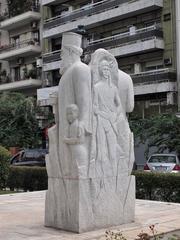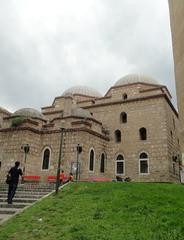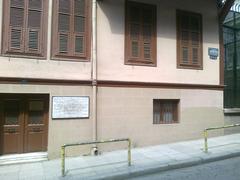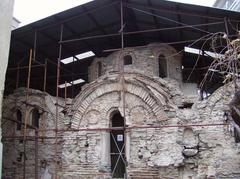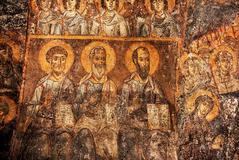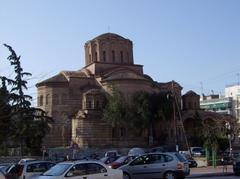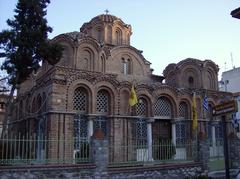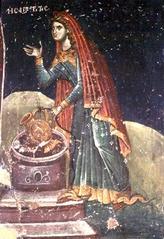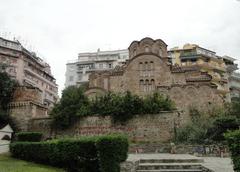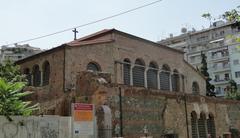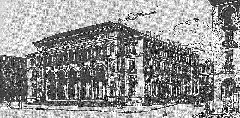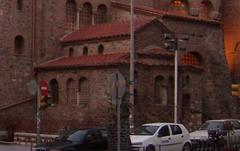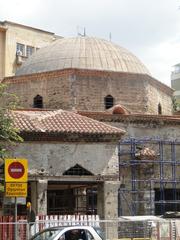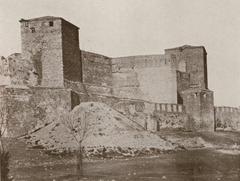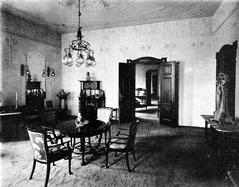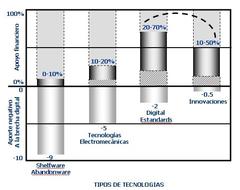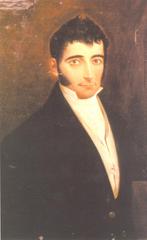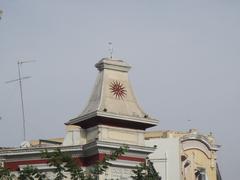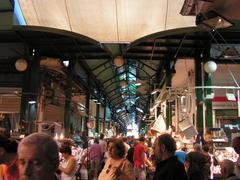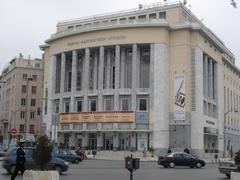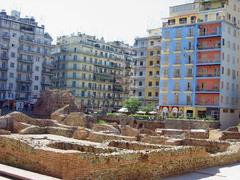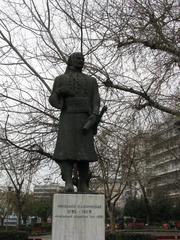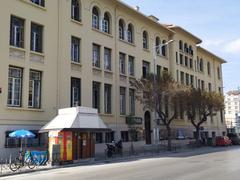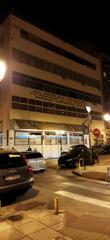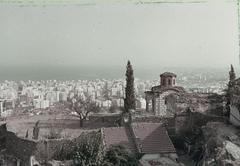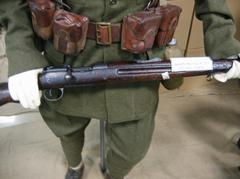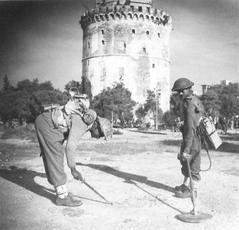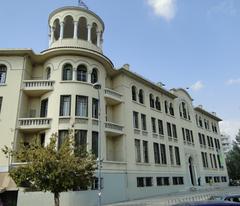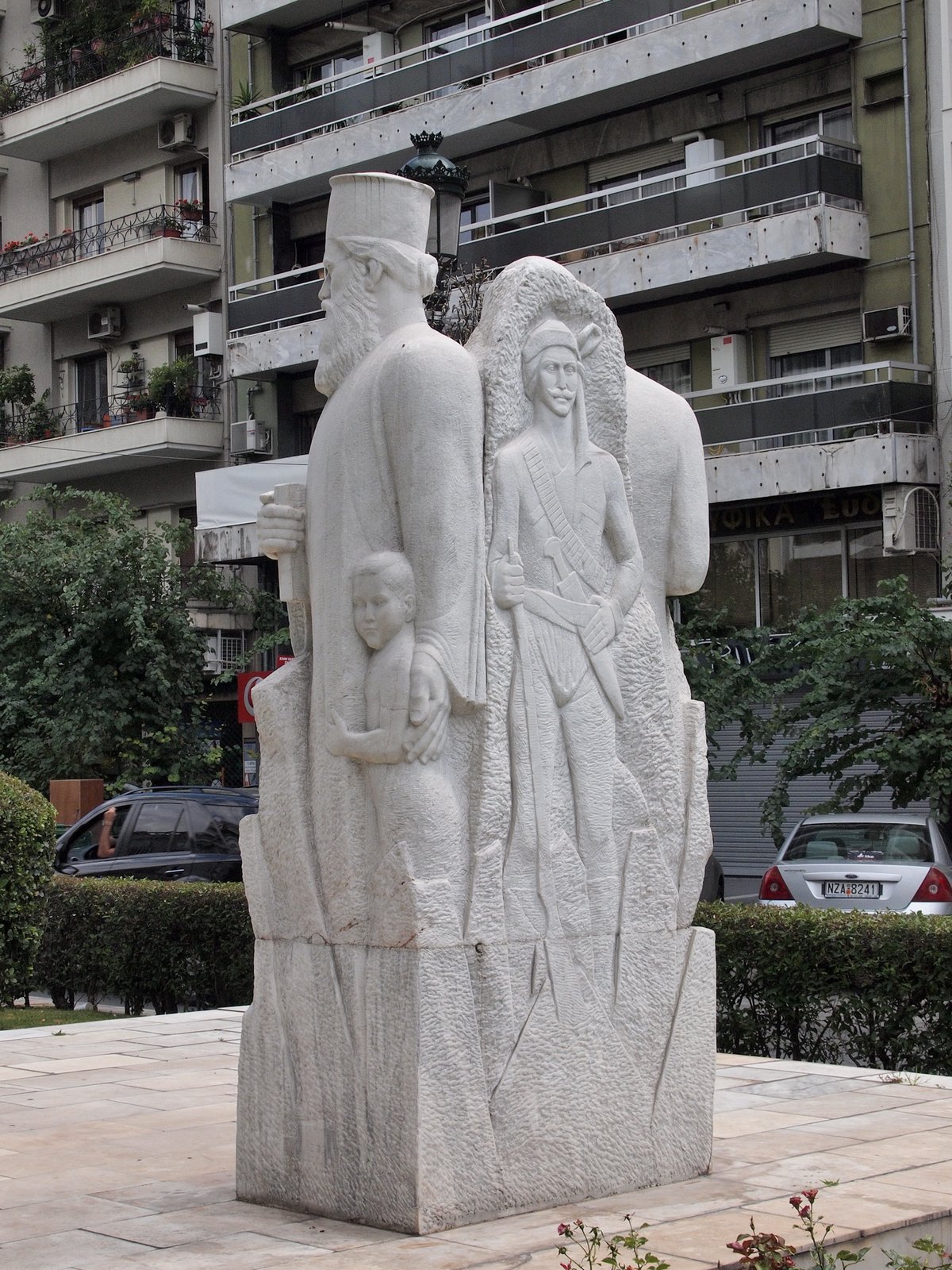
Pontian Hellenism Memorial Thessaloniki: Visiting Hours, Tickets, and Comprehensive Guide
Date: 14/06/2025
Introduction
The Memorial of Pontian Hellenism in Thessaloniki stands as both a poignant tribute and a vital cultural landmark, commemorating the memory, resilience, and ongoing heritage of the Pontian Greek community. Situated centrally in Saint Sofia Square and complemented by the Pontian and Asia Minor Hellenism Memorial Park in Neapolis–Sykeon, the memorials honor the victims of the Pontian Greek Genocide (1914–1923), during which approximately 350,000 Pontian Greeks lost their lives. Beyond remembrance, these sites serve as focal points for cultural celebration, spiritual observance, and education, reflecting Thessaloniki’s role as a historical refuge and vibrant center for the Pontian diaspora.
This guide details everything you need to know for a meaningful visit: locations, visiting hours, accessibility, site features, historical context, practical tips, and more. Whether you are a history enthusiast, a member of the diaspora, or a traveler exploring Thessaloniki’s rich tapestry, the Memorial of Pontian Hellenism offers a unique and profound experience.
For further context and resources, see the Central Macedonia Tourism Portal, Greek Reporter, and Orthodox Times.
Contents
- Introduction
- Location and Getting There
- Visiting Hours and Tickets
- Features and Layout of the Memorials
- Historical and Cultural Significance
- Community, Religious, and Cultural Dimensions
- Educational and Advocacy Roles
- Practical Visitor Information
- Commemorative Events and Best Times to Visit
- Safety, Etiquette, and Responsible Tourism
- Frequently Asked Questions (FAQ)
- Visuals and Interactive Media
- Sources and Further Reading
- Conclusion
Location and Getting There
Main Sites
- Memorial to the Genocide of Pontian Hellenism
- Location: Saint Sofia Square, adjacent to the Byzantine Church of Agia Sophia, Thessaloniki’s historical center (visit-centralmacedonia.gr).
- Pontian and Asia Minor Hellenism Memorial Park
- Location: Neapolis–Sykeon municipality, at the intersection of Riga Feraios, Andreas Papandreou, and Nafpaktou streets (athens-times.com).
Accessibility
- Public Transport: Both memorials are accessible via city buses and taxis. Saint Sofia Square is within walking distance from Aristotelous Square, the city’s main hub.
- By Car: Public parking is available nearby, though it may fill quickly during events.
- On Foot: The central city location is ideal for pedestrians exploring Thessaloniki’s historical areas.
Visiting Hours and Tickets
- Hours: Both memorials are open-air and accessible 24/7.
- Admission: Free. No tickets or reservations are required.
- Accessibility: Wheelchair-accessible paths and ramps are provided at both sites.
Features and Layout of the Memorials
Saint Sofia Square Monument
- Design: Created by sculptor Georgios Kikotis and unveiled in 2002, it features a bronze statue of a mourning mother holding her deceased child, set atop a marble base inscribed with the names of affected Pontic regions.
- Atmosphere: The site offers benches and shaded areas, fostering quiet reflection and solemnity.
Neapolis–Sykeon Memorial Park
- Design: Inaugurated in 2023, the park features a distinctive six-meter-tall inclined column topped with seven illuminated birds, symbolizing the indomitable spirit of Pontian and Asia Minor Greeks.
- Facilities: Includes landscaped paths, greenery, and seating areas ideal for contemplation or community gatherings.
Historical and Cultural Significance
The memorials are dedicated to the memory of approximately 350,000 Pontian Greeks who perished during systematic persecution and genocide between 1914 and 1923 (greekreporter.com). Thessaloniki became a haven for survivors, shaping the city’s multicultural identity and making these sites deeply significant for descendants and the broader Greek community.
The central motifs—mourning figures, illuminated birds, and inscribed names—serve as powerful reminders of loss, survival, and hope. The memorials are focal points for annual remembrance ceremonies (especially on May 19th), ongoing cultural activities, and intergenerational storytelling.
Community, Religious, and Cultural Dimensions
- Pontian Greek Identity: The memorials reinforce the preservation of Pontian language, music, dance, and religious customs within Thessaloniki and the diaspora (eurasiatique.ca).
- Religious Significance: Orthodox Christian rituals and processions often begin at the memorial, with the icon of Panagia Soumela frequently present during commemorations (orthodoxtimes.com).
- Artistic Expression: Traditional music and dance performances, such as the Pontian war dance accompanied by the lyra, are integral to events at the site (greekreporter.com).
Educational and Advocacy Roles
The memorials serve as living classrooms, educating visitors and local students about Pontian history and the broader context of forced migrations, genocide, and cultural resilience. Pontian associations leverage these sites for advocacy, working towards international recognition of the genocide and fostering intercultural dialogue (greekreporter.com).
Practical Visitor Information
Travel Tips
- Language: Greek is the official language; English is widely spoken in tourist areas (thessalonikitourism.gr).
- Dress Code: Modest attire is recommended, especially during ceremonies.
- Facilities: Restrooms are not available at the sites, but cafes and restaurants nearby can be used.
- Photography: Permitted, but be discreet during commemorative events or when individuals are mourning.
Safety and Security
- Thessaloniki is generally safe. Exercise standard precautions, especially at night.
- Isolated vandalism incidents have occurred but are promptly addressed by local authorities (athens-times.com).
Accessibility
- Both memorials offer wheelchair access and paved paths.
- Seating and shaded areas are available.
Currency and Payments
- Greece uses the Euro (€). Credit cards are widely accepted, but carrying some cash is advisable (thessalonikitourism.gr).
- Tipping is appreciated but not mandatory (takemetogreece.com).
Emergency Contacts
- General Emergency: 112
- Police: 100
- Tourist Police: +30 2310 554871
- Ambulance: 166
- Duty Hospitals: 1434
Public Holidays
- The memorials are always accessible, but nearby shops may close on Greek public holidays (thessalonikitourism.gr).
Commemorative Events and Best Times to Visit
- May 19th: Pontian Genocide Memorial Day, marked by official ceremonies and cultural events.
- Spring and Autumn: Offer the best weather for outdoor visits, with mild temperatures ideal for walking tours.
Safety, Etiquette, and Responsible Tourism
- Approach with empathy and respect for the site’s significance.
- Remain silent during prayers and commemorative events.
- Follow instructions from organizers during public ceremonies.
Frequently Asked Questions (FAQ)
Q: What are the visiting hours?
A: Both memorials are open 24/7, being outdoor public monuments.
Q: Is entry free?
A: Yes, admission is always free.
Q: Are guided tours available?
A: No official tours or audio guides are offered at the memorials, but broader Thessaloniki historical tours may include the sites.
Q: Are the sites accessible for people with disabilities?
A: Yes, both are wheelchair accessible with paved paths and ramps.
Q: What is the nearest major landmark?
A: The Aghia Sophia Church (UNESCO-listed) is adjacent to the main monument.
Visuals and Interactive Media
- Explore high-quality images and virtual tours at Thessaloniki Tourism.
- For a deeper digital experience, view interactive maps and virtual walks through Thessaloniki’s historical landscape.
Sources and Further Reading
- Monument to the Genocide of Pontian Hellenism (Central Macedonia Tourism Portal)
- 100 Years Since the Pontian Genocide (Greek Reporter)
- Global Center of Pontian Hellenism to Turkish President (Orthodox Times)
- Thessaloniki Vandalized the Monument of Pontian and Asia Minor Hellenism (Athens Times)
- Official Thessaloniki Tourism Information
- Tipping in Greece Guide
Conclusion
The Memorial of Pontian Hellenism in Thessaloniki is far more than a historical monument; it is a living testament to memory, survival, and the enduring spirit of the Pontian Greeks. Free and open to all, these sites invite visitors to reflect on the past, engage with vibrant cultural traditions, and participate in a broader story of resilience. Whether you attend on May 19th for commemorative events or visit at your leisure, the memorials promise a meaningful and educational experience within Thessaloniki’s rich heritage.
Plan your visit today, explore nearby historical treasures, and deepen your understanding of Pontian Hellenism’s vital role in Greek and world history. For more travel guidance and up-to-date tips, download the Audiala app and follow official tourism updates.
